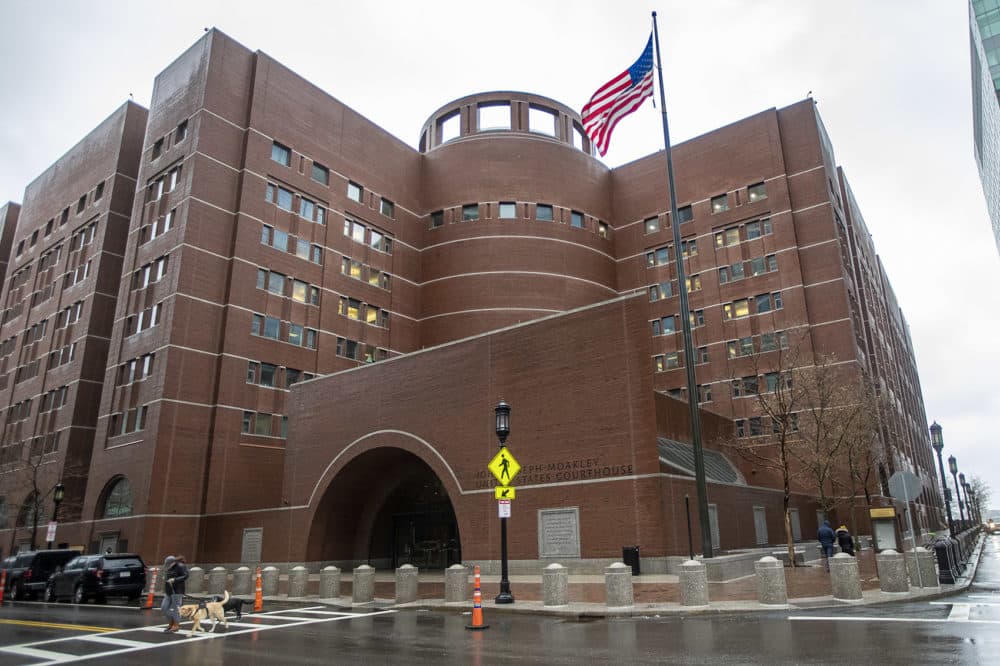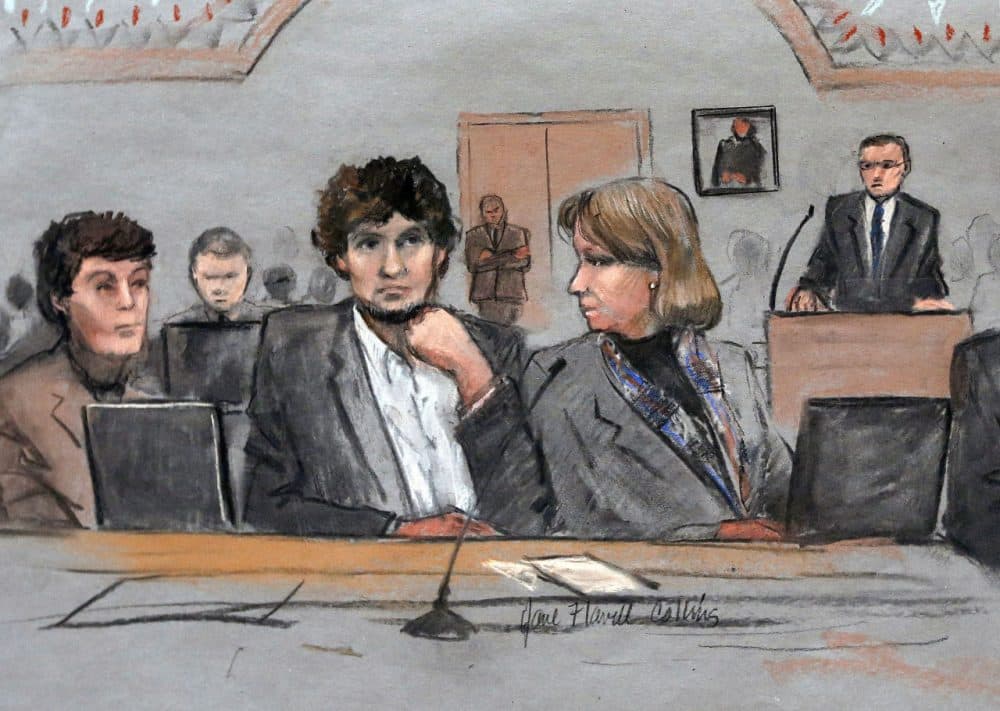Advertisement
Tsarnaev’s Attorneys Want Him Off Death Row. Here’s What They'll Argue
Resume
More than four years after Boston Marathon bomber Dzhokhar Tsarnaev was sentenced to death for killing four people and wounding hundreds more, his attorneys will argue in a Boston courtroom Thursday why his conviction and death sentence should be thrown out.
Attorneys for Tsarnev’s defense and the federal government will each have an hour to make their cases in front of three appeals court judges at the Moakley Courthouse in Boston — the same courthouse where Tsarnaev was sentenced in 2015.
Both sides have already filed hundreds of pages of court records arguing their case. Here's what they say:
What Tsarnaev's Lawyers Argue
Attorneys for Tsarnaev, in their 1,126-page brief, listed out 15 errors they say were made by the lower court.
Three notable claims made by the lawyers are detailed below and focus broadly on the following:
- the location of the trial;
- the actions of at least two jurors;
- a lack of evidence about the alleged previous crimes of Tsarnaev's older brother and co-conspirator, Tamerlan Tsarnaev, who was killed in the shootout with Watertown police.
The Trial In Boston
“This case should not have been tried in Boston." That's the first line of the appeal's introduction.
“Almost everyone in the Boston metropolitan area had a friend or family member at the Marathon, sheltered in place, participated in the manhunt, or bought or wore Boston Strong paraphernalia,” the attorneys wrote. “This Court should presume prejudice because constant, intense, and inflammatory pre-trial publicity saturated all of Eastern Massachusetts, so much so that more than two-thirds of the venire [jury pool] believed Tsarnaev was guilty before they heard a single witness.”
Tsarnaev’s attorneys essentially asked, if this case wasn’t eligible for a change of venue, what case ever could be?
That was the same argument made in an amicus brief by eight “prominent citizens,” including former Mass. Supreme Judicial Court Justice Fernande R.V. Duffly and James Doyle, former head of the public defender division of the state's Committee for Public Counsel Services.
Attorney George Kendall filed that brief. He said the Constitution requires not an uninformed jury, but a disinterested one.
“Given the extraordinary nature of the crime and then succeeding events thereafter, the quartering in place … the vast majority of people in the Greater Boston area were not disinterested,” he said. “They'd all been affected, not in a little way, but in large ways.”
Jurors in other cities might have known about the case, Kendall said, but they would be far less likely to have been personally affected.
It's an argument Tsarnaev’s attorneys have made before — four times, in fact. Their requests to move the trial out of Boston were all denied. On the eve of trial, they made their last request to the First Circuit Court of Appeals — the same court that will hear this appeal -- and lost.
Former federal judge Nancy Gertner said this was a case where Boston, through its iconic marathon, was the victim.
"You would never have a trial in the victim's home," she said. "And this is essentially the victim's home."
Jurors' Social Media Posts
Tsarnaev’s attorneys contend the panel that convicted him and sentenced him to death was a “compromised jury.” Specifically, they called out two jurors — the forewoman and juror 138.
Attorneys said the forewoman made more than 20 Twitter posts about the bombings before the trial, and retweeted one post calling Tsarnaev a “piece of garbage.” She posted about sheltering in place during the manhunt for Tsarnaev. But in her questionnaire and in oral questioning, Tsarnaev's lawyers wrote that the forewoman answered she hadn’t commented on the case online, or been on lockdown.
Juror 138, meanwhile, posted about being called to jury duty on Facebook. Friends commented on his post, and hours after he’d been instructed not to, he continued to post about jury selection and the case. Posts included friends telling him to “play the part” and “get on the jury” to send Tsarnaev “to jail where he will be taken care of.” He replied with details about jury selection and being “ten feet” from Tsarnaev.
When asked by the court about talking or posting about the case, he said he hadn’t.
Judge George O’Toole was made aware of the posts that defense attorneys said “conceal[ed] bias against Tsarnaev and their disobedience of the Court’s instructions.” Yet, they wrote, O’Toole let them stay on the jury and didn’t ask any follow up questions before seating them.
Gertner said in a death penalty case like this, the judge's obligation to secure a fair jury is doubled. In her view, O'Toole should have taken "every step" to make sure jurors were unbiased.
"This is not just jurors lying about any old thing," she said. "This is jurors lying about their participation in the case and lying about their perspectives on the case. It doesn't get any worse than that."
Kendall said these issues with the jurors are tied to the decision to not move the case.
“When you keep a case like this in Boston, there are going to be people who actually want to get on the case,” he said. “And so sometimes they will not be forthcoming and truthful ... and that happened in this case with at least these two jurors where they were not.”
The Waltham Triple Murder
On Sept. 11, 2011, investigators believe Tamerlan Tsarnaev, along with a friend, Ibragim Todashev, killed three men inside a Waltham home.
In court documents, police said that after the bombings Todashev confessed to his and Tamerlan’s involvement in the murders. Todashev was killed in a confrontation with police shortly after the alleged confession.
The defense wasn’t allowed to talk about the murders at trial. If they had, they believed it would have shown the radicalization and violence of Tamerlan Tsarnaev, and the influence he may have had over his little brother.
“The jury heard only a misleadingly sanitized picture of Tamerlan from the prosecution — that he was merely a ‘bossy’ older brother prone to verbal outbursts,” Tsarnaev’s attorneys wrote in their brief.
Had the jury known more, they may have considered the brothers' relationship a mitigating factor and sentenced Tsarnaev to life in prison, instead of death. Only three of the 12 jurors said Tsarnaev “acted under the influence of his older brother” or “was particularly susceptible to his older brother’s influence.”
Gertner said, to her, the issue of the Waltham evidence is clear.
"When death is on the line, you err on the side of inclusion," she said.

What The Prosecution Says
In their own 400-plus page brief, the government refuted Tsarnaev’s defense claims.
They detailed what they say was his quiet radicalization while he was a student at UMass Dartmouth. They also reprinted what Tsarnev wrote while hidden in a boat during the manhunt, calling it his “jihadist justification” of the attacks.
And, in a particularly powerful section, prosecutors reminded the court of the devastating injuries Tsarnaev and his brother inflicted on marathon spectators with their homemade bombs.
Tsarnaev got a fair trial in Boston, the government said. Yes, much of the jury pool knew about the bombing, but those seated said they could set aside what they knew and be impartial. And, they argued, there was nowhere to move the trial where people wouldn’t have heard about the attacks.
“Tsarnaev would have been hard-pressed to find any U.S. jurisdiction in 2015 where a significant percentage of potential jurors had not been exposed to media coverage of the bombing,” prosecutors wrote.
Plus, prosecutors contended in their brief that neither of the two jurors Tsarnaev's lawyers accuse of wrongdoing made dishonest statements that would have justified their removal from the case. Besides that, they said O’Toole had already (properly) ruled on their removal during jury selection.
Finally, in regards to the Waltham triple murder being entered as evidence, prosecutors said that was a drug-related robbery and completely unrelated to the marathon bombing. Nothing about those murders showed Tamerlan “influenced” or “intimidated” his little brother, they said.
“Rather," prosecutors wrote, "the evidence showed that Tsarnaev was independent, did not follow his brother’s strict religious lifestyle, and was a willing and eager participant in the marathon bombing."
Who Will Decide On The Appeal?
The case is before the First Circuit Court of Appeals, which sits in Boston and includes the federal districts of Massachusetts, Maine, New Hampshire, Puerto Rico and Rhode Island. Judges Juan Torruella, William J. Kayatta, Jr. and O. Rogeriee Thompson will hear the arguments.
Torruella already weighed in on one part of the defense claims: the change of venue. In 2015, when Tsarnaev’s defense unsuccessfully asked the appeals court to seek a new venue because of pre-trial publicity in Boston. Torruella “vehemently” dissented, calling the pre-trial publicity “pervasive, prejudicial, and inflammatory.”
Where Is Tsarnaev? Will He Be There?
Tsarnaev, now 26 years old, is on death row at the "Supermax" federal prison in Florence, Colorado. He is not expected to be in the court Thursday.
This segment aired on December 12, 2019.
